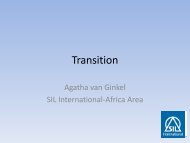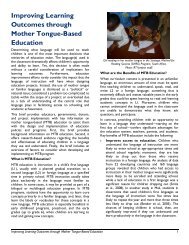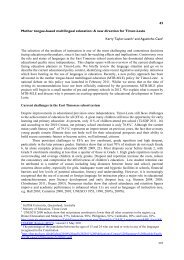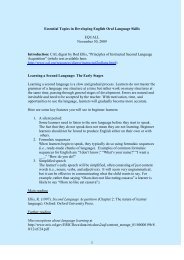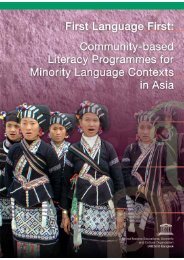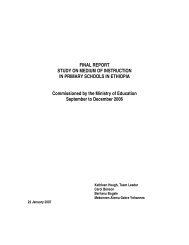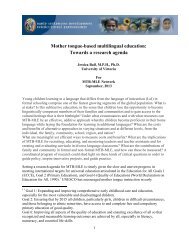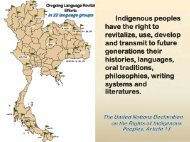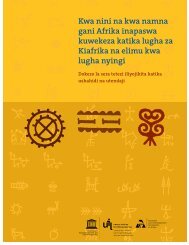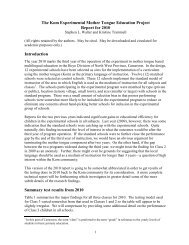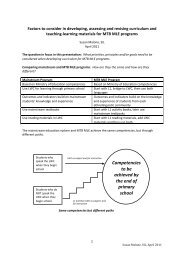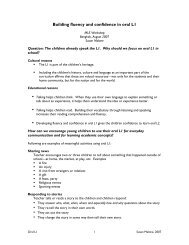Part II.pdf - MTB-MLE Network
Part II.pdf - MTB-MLE Network
Part II.pdf - MTB-MLE Network
You also want an ePaper? Increase the reach of your titles
YUMPU automatically turns print PDFs into web optimized ePapers that Google loves.
determined in successful programmes of non-formal education (Kosonen 1998) or learner-centred<br />
adult literacy (Malone & Arnove 1998).<br />
<strong>Part</strong>icularly important are supportive external conditions. Political conditions prevailing in the area<br />
must support, or at least permit, independent activities of minority peoples, particularly in education.<br />
Sufficient funding for activities is critical. Yet, it is also important that local language communities<br />
contribute to the effort in various ways – not necessarily financially – as this often strengthens the<br />
community ownership. The goals of local language education have rarely been achieved without<br />
supportive economic and political conditions. However, the case of the Democratic Republic of<br />
Congo (Hill 2002; Robinson & Gfeller 1997) shows that if a supportive environment exists for<br />
education in local languages, it can be successfully provided even under difficult economic<br />
circumstances.<br />
Local initiatives seem more likely to be sustained than activities based on outsiders’ initiatives.<br />
Local communities can be responsible for many activities in local language development and the<br />
provision of education in local languages. Outside contribution is needed if community members<br />
do not have the required linguistic and educational expertise. In some cases, the role of outsiders<br />
as consultants and trainers may be sufficient, but in most cases, there is a need for cooperation of<br />
local communities and outside stakeholders. Relevant outside stakeholders include local or foreign<br />
linguists, educators and other academics, as well as national or international NGOs, or various funding<br />
and donor agencies.<br />
The community-based approach seems to be an inexpensive, efficient and sustainable way of providing<br />
literacy and basic education in local languages. However, this approach requires continuous and<br />
regular internal assessment, and the modification of existing practices. In most cases, this approach<br />
depends on multiple partnerships. Multipartite cooperation and coordination of various stakeholders’<br />
responsibilities must be unambiguous and straightforward, or otherwise cooperation may decelerate,<br />
or even paralyse, the endeavour. Clear delegation of roles, responsibilities and power is critical,<br />
and calls for transparency in all action. The key issue throughout the process is that the community<br />
itself is equipped to be responsible for most activities. This requires continuous awareness raising,<br />
community mobilization and various training activities.<br />
The factors discussed above include some general preconditions for successful provision of education<br />
in local languages. Yet, the current knowledge about what supports and what hinders the provision<br />
of education in local languages is quite limited. More research is needed, especially in determining<br />
(a) which factors can be anticipated as critical before an education programme commences,<br />
(b) which factors are not critical, but rather facilitate the efforts, and (c) which factors can be identified<br />
only ex post facto. Furthermore, practitioners and researchers would benefit from knowing which<br />
factors are culture-specific and which are more universal. Thus, there is an apparent need for research<br />
that would thoroughly analyse different well-documented cases in different contexts, and would<br />
build also on the experience of personnel who have undertaken such endeavours. Further studies<br />
might shed light on factors thus far not determined.<br />
117



